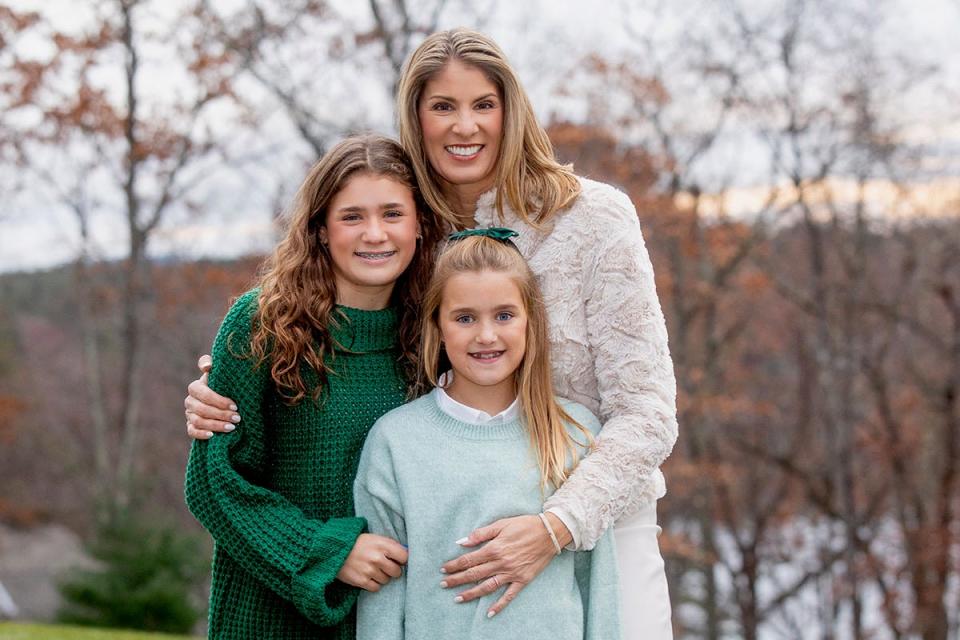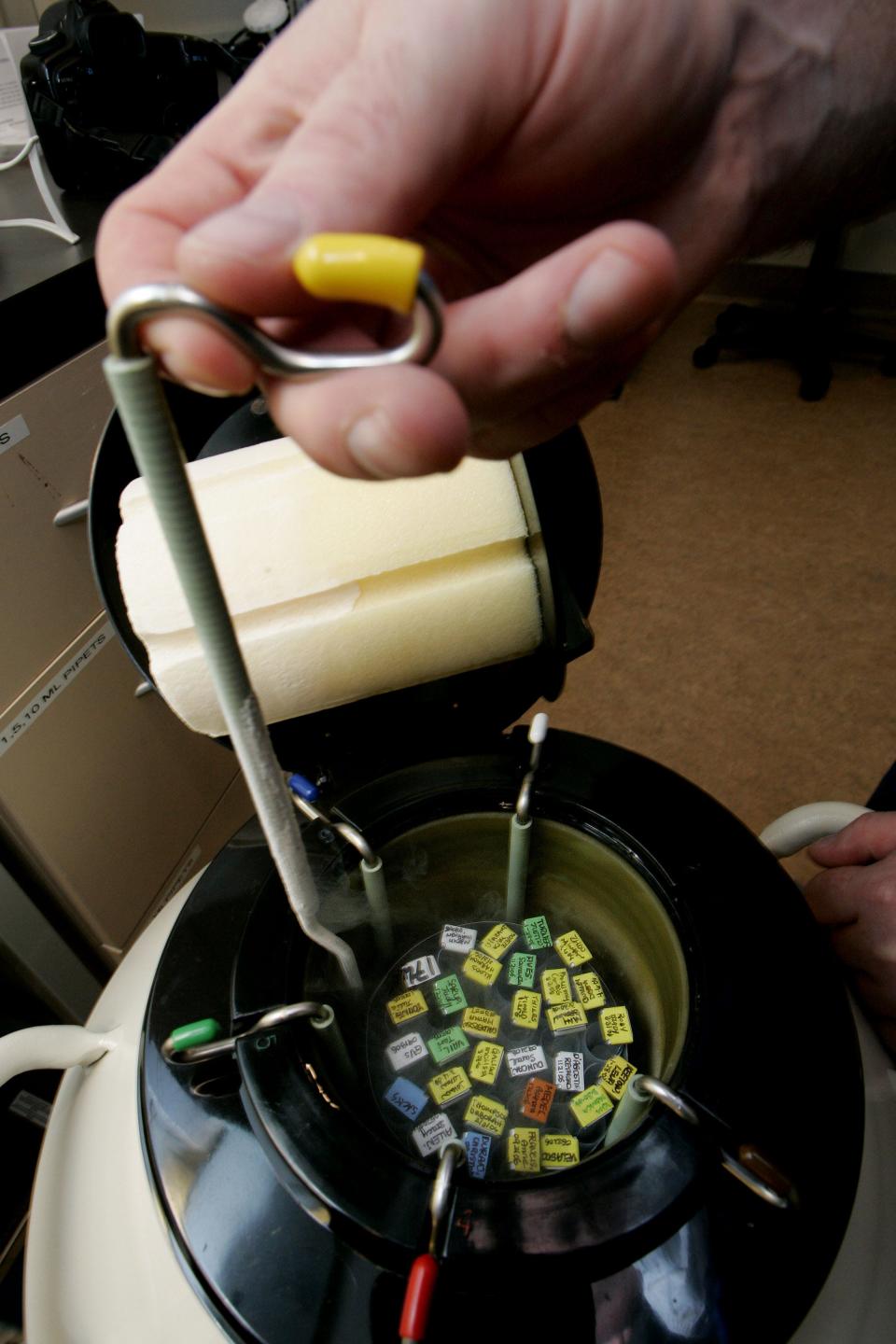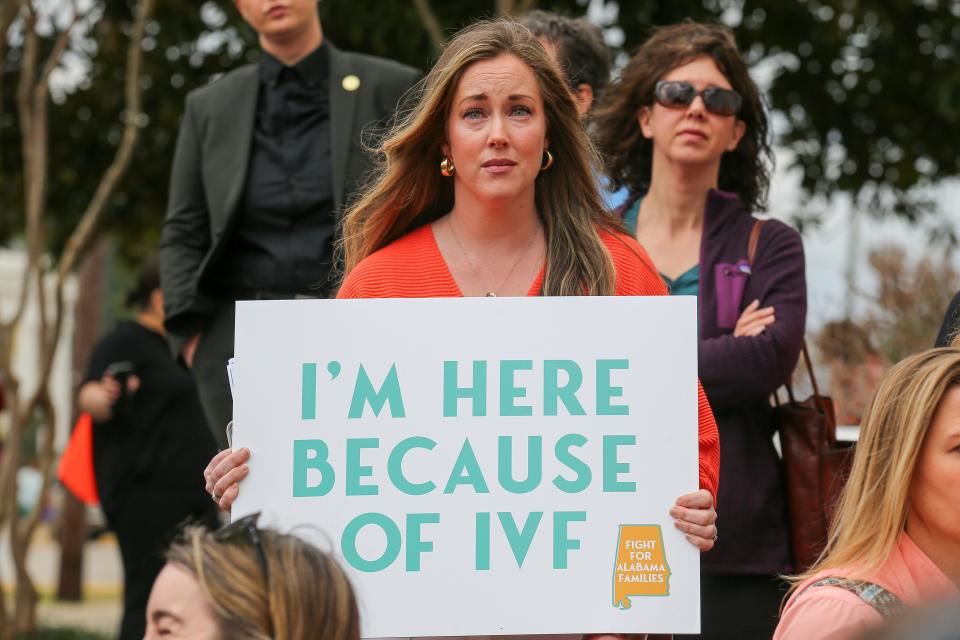After 'grueling' IVF journey, Rep. Lori Trahan has an eye on Biden's SOTU, Alabama ruling
- Oops!Something went wrong.Please try again later.
- Oops!Something went wrong.Please try again later.
The daily injections, the multiple surgeries, the constant visits with doctors, the emotional, physical, financial, burden—and the frequent heartbreak: Rep. Lori Trahan, Democrat of Massachusetts, remembers those days painfully well.
She is one of hundreds of thousands of women who turn to IVF, or in vitro fertilization, every year as the "last hope" to start a family.
“That process was harder than I ever could have imagined,” Trahan told USA TODAY. “I don't think women talk about how grueling it is. I don’t really talk about it much, but becoming a mom certainly wasn't easy for me.”

Trahan, 50, is now the mother of two girls, ages 13 and 9, conceived via IVF, where an egg is combined with sperm outside the body in vitro − "in glass.”
But the decision to keep that aspect of her life private changed when the Alabama Supreme Court ruled last month that frozen embryos are children and that people can be held legally responsible if they are destroyed. The court’s ruling alarmed prospective parents and IVF clinics, and the real-world consequences were immediate. At least three Alabama medical facilities halted in vitro fertilization treatments.
More: Donald Trump, under fire over abortion, calls on Alabama to reverse course and protect IVF
What will Biden say about IVF during State of the Union?
As President Joe Biden addresses the nation Thursday in his State of the Union speech, hopeful parents and medical experts will be looking for signs that access to IVF, a treasured intervention, is not in jeopardy, said Trahan, a member of the House Democratic Women’s Caucus.
Her guest at the event will be Dr. Pietro Bortoletto, director of reproductive surgery at Boston IVF, where Trahan underwent IVF treatment for both her daughters.

“I think millions of women across America will be looking to President Biden during his address for reassurance that Democrats will do everything in our power to protect access to reproductive care, including IVF, Mifepristone and abortion,” she told USA TODAY.
Trahan said she expects Biden to call on Congress to pass legislation to protect IVF and to "restore the reproductive rights that have been systematically stripped from women in Republican controlled states like Alabama following the Dobbs’ decision."
More: When is the State of the Union? How to watch the 2024 Presidential address

The Alabama decision designating frozen embryos as "extrauterine children" said the people of the state required the court to "treat every human being in accordance with the fear of a holy God, who made them in His image.”
Both Republican-controlled chambers of the Alabama Legislature voted Wednesday on identical bills protecting patients and medical professionals from civil and criminal liability for in vitro fertilization treatments, as lawmakers scrambled to address the court's surprise ruling. Alabama Gov. Kay Ivey signed a bill into law aimed late Wednesday. Though the new law does not address the issue of personhood of frozen embryos, it affords providers of the with criminal immunity when it comes to destroyed embryos.
Among the guests joining First lady JIll Biden is Latorya Beasley of Birmingham, Alabama, who was going through a round of IVF treatment and her embryo transfer was abruptly stopped after the court's decision, signaling that Biden will emphasis her experience as yet another example of "how the overturning of Roe v. Wade has disrupted access to reproductive health care for women and families across the country."
“The Alabama IVF case was not an aberration. It was a warning,” Democratic Women’s Caucus Chair Lois Frankel, D-Florida, said immediately after the ruling. She called for national legislation to protect the treatment.
How common is IVF in the US?
Approximately 2.3% of all infants born in U.S are conceived using assisted reproductive technology, which includes IVF, according to the Centers for Disease Control.
It’s not just couples struggling with infertility that use IVF, but patients diagnosed with cancer, who want to freeze their eggs before undergoing chemotherapy, or those who have genetic diseases like the BRCA mutation or cystic fibrosis − conditions that they don't want to pass on to their children, explained Dr. Bortoletto.
Typically, women freeze anywhere from five to 15 embryos over the course of a single IVF cycle, if they're doing IVF under the age of 35, he said. This is generally done so the couple can use them later to expand their families.
More: Alabama justice invoked 'the wrath of a holy God' in IVF opinion. Is that allowed?
“The younger you are, generally the more embryos you have frozen because the ovaries are just younger and healthier,” he said. “As you get older, that number decreases and IVF becomes less and less successful.”
On average, a single IVF cycle in the U.S. could cost between $10,000 and $15,000, depending upon insurance coverage, patient characteristics and the treatment center, according to University of Pennsylvania Health System.
After a couple has decided their family is complete, a lot of the embryos are discarded, a smaller percentage of them donated to research or training of embryologists or even to other couples. The costs of freezing embryos ranges from $50 to $100 per month, with most people freezing them for less than five years, he said.
Frozen embryos as children can have a chilling effect
Legally designating embryos as people can have a chilling effect on doctors and clinics, as was quickly seen in Alabama.
“It means that anyone handling embryos is subject to significant criminal charge. If the power goes out in the building and the embryo gets damaged, clinics are liable,” said Dr. Bortoletto “If that embryo is being transported on a truck to be delivered to a new IVF center, that truck gets hit on the highway, that company is liable. And we're not talking about liability for property, we're talking about manslaughter, murder charges.”

Dr. Bortoletto said he was hoping Biden would have a plan for ensuring access to reproductive care in all 50 states.
“I specifically want to hear how we can enshrine protections for IVF at a federal level to prevent a patchwork of access to this essential, life creating treatment for all Americans,” he said.
More: When IVF felt hopeful, this couple suddenly lost all their embryos. Here's who they blame.
For Trahan, who had to deal with multiple IVF cycles due to miscarriage and other issues while she was trying to get pregnant a second time, the Alabama ruling was a “gut punch”—and something that will keep her in the fight.
“I look at my own daughters and I think about how hard I worked to have them and to have the family that I dreamed of,” she said. “To think that they might not have the same opportunity that their mom did is something that's going to keep me in this fight forever.”
Swapna Venugopal Ramaswamy is a White House Correspondent for USA TODAY. You can follow her on X @SwapnaVenugopal
This article originally appeared on USA TODAY: Rep. Lori Trahan talks IVF experience ahead of Biden SOTU

